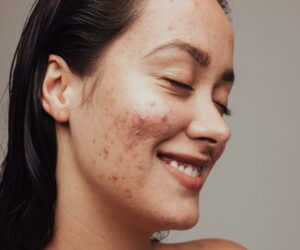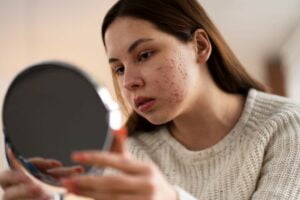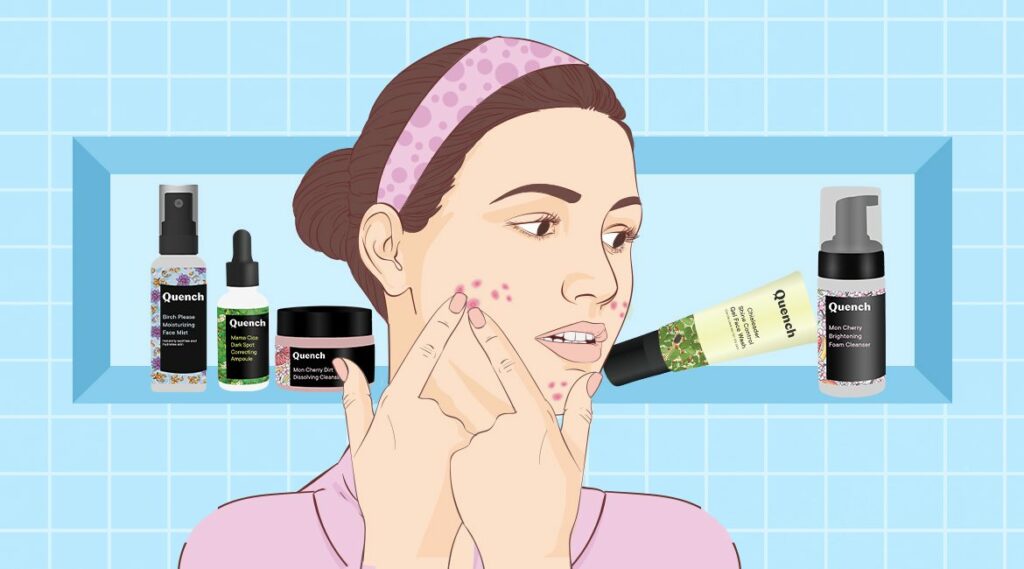Living with Polycystic Ovary Syndrome (PCOS) brings forth a myriad of challenges, and one of the most persistent struggles is acne-prone skin. The hormonal imbalances associated with PCOS often contribute to stubborn acne breakouts, leaving many searching for effective solutions. In this comprehensive guide, we delve into the world of PCOS medications for acne, offering insights into the most promising treatments and empowering you to take charge of your skin health.
Contents
Why Does PCOS Trigger Acne?
 Polycystic Ovary Syndrome (PCOS) is a complex endocrine disorder that can manifest in various ways. One of the common and distressing symptoms for many individuals with PCOS is acne. Here’s a breakdown of why PCOS often triggers acne:
Polycystic Ovary Syndrome (PCOS) is a complex endocrine disorder that can manifest in various ways. One of the common and distressing symptoms for many individuals with PCOS is acne. Here’s a breakdown of why PCOS often triggers acne:
- Androgen Imbalance: Women with PCOS frequently experience elevated levels of androgens, which are male sex hormones that women also produce, albeit in smaller amounts. The excess androgens can lead to increased sebum (oil) production in the skin.
- Increased Sebum Production: Androgens stimulate the sebaceous glands in the skin to produce more sebum. Elevated sebum levels create an environment conducive to the growth of acne-causing bacteria, leading to the development of inflammatory and non-inflammatory acne lesions.
- Insulin Resistance: Insulin resistance is another common feature of PCOS. When cells become resistant to the effects of insulin, the body compensates by producing more insulin. Elevated insulin levels can contribute to increased androgen production, exacerbating hormonal imbalances.
- Inflammation and Insulin: Higher insulin levels can also trigger inflammation in the body. Inflammation, in turn, can exacerbate acne by promoting the clogging of hair follicles and the formation of acne lesions.
- Ovulatory Dysfunction: Irregular or absent menstrual cycles, a characteristic of PCOS, often indicate ovulatory dysfunction. The lack of regular ovulation can result in progesterone deficiency. Thus, contributing to hormonal imbalances that influence skin health.
- Genetic Factors: There may be a genetic predisposition to both PCOS and acne. Individuals with a family history of PCOS or acne might be more susceptible to these conditions.
Understanding the interplay of these factors is crucial in developing effective strategies for managing acne in individuals with PCOS. If you suspect you have PCOS or are experiencing persistent acne, it’s essential to consult with a healthcare professional for a proper diagnosis and tailored treatment plan.
What Are Some PCOS Medications for Acne?
 Several medications are commonly prescribed to manage acne in individuals with Polycystic Ovary Syndrome (PCOS). These medications aim to address the hormonal imbalances associated with PCOS and reduce the severity and frequency of acne breakouts. Here are some PCOS medications for acne:
Several medications are commonly prescribed to manage acne in individuals with Polycystic Ovary Syndrome (PCOS). These medications aim to address the hormonal imbalances associated with PCOS and reduce the severity and frequency of acne breakouts. Here are some PCOS medications for acne:
Spironolactone
- Mechanism of Action: Spironolactone is an aldosterone antagonist that also exhibits anti-androgenic properties. It competitively inhibits androgen receptors, reducing the effects of androgens on the skin.
- Effects on Acne: By blocking androgens, spironolactone decreases sebum production, leading to a reduction in oily skin. This, in turn, helps prevent clogged pores and the development of acne lesions.
Combined Oral Contraceptives (Birth Control Pills)
- Regulation of Hormones: Birth control pills containing estrogen and progestin work by regulating hormonal fluctuations associated with PCOS. They suppress the production of androgens and promote a more balanced hormonal environment.
- Impact on Sebum Production: Birth control pills can reduce sebum production, minimizing the occurrence of acne. They are particularly effective for women with PCOS who experience irregular menstrual cycles.
Anti-Androgen Medications
- Targeting Androgen Activity: Anti-androgen medications like cyproterone acetate work by directly inhibiting the effects of androgens. This helps mitigate symptoms associated with elevated androgen levels, including acne.
- Complementary to Other Treatments: These medications may be used in conjunction with other treatments, such as hormonal contraceptives or lifestyle changes, to optimize acne management.
Metformin
- Insulin Sensitivity: Metformin addresses insulin resistance, a common concern in PCOS. By improving insulin sensitivity, metformin indirectly lowers androgen levels, which can have a positive impact on acne severity.
- Combination Therapy: Metformin is often prescribed alongside other medications to comprehensively address the metabolic and hormonal aspects of PCOS.
Retinoids (Topical and Oral)
- Cell Turnover: Topical retinoids promote the turnover of skin cells, preventing the accumulation of dead skin cells that can contribute to clogged pores.
- Reduction of Comedones: By reducing the formation of comedones (clogged pores), retinoids play a crucial role in preventing the development of both inflammatory and non-inflammatory acne lesions.
Clindamycin and Erythromycin (Topical Antibiotics)
- Bacterial Control: Topical antibiotics control the growth of acne-causing bacteria on the skin’s surface. And, helping to reduce inflammation and the formation of pustules.
- Anti-Inflammatory Effects: In addition to their antibacterial properties, these antibiotics also exhibit anti-inflammatory effects, contributing to the overall management of acne.
Drospirenone-Containing Birth Control Pills
- Anti-Androgenic Progestin: Drospirenone is a progestin with anti-androgenic properties, making it an effective component in birth control pills for managing acne in women with PCOS.
- Balancing Hormones: By modulating hormonal fluctuations, these pills contribute to a more balanced hormonal profile. This is crucial for acne control.
Oral Contraceptives with Low Androgenic Activity
- Reducing Androgenic Effects: Progestins with low androgenic activity are chosen to minimize the potential exacerbation of androgen-related symptoms, including acne.
- Improving Hormonal Balance: These birth control pills aim to provide hormonal balance without promoting the androgenic effects that can contribute to acne development.
Overall, the choice of PCOS medications for acne involves a careful consideration of the underlying hormonal imbalances and the specific needs of the individual. These medications can be used alone or in combination, depending on the severity of symptoms and the overall health of the person with PCOS.
Which Medicine Is Best For PCOS?
Determining the “best” medicine for Polycystic Ovary Syndrome (PCOS) depends on individual factors, including:
- the specific symptoms experienced
- personal health considerations
However, one widely prescribed medication that addresses multiple facets of PCOS is Metformin. Metformin, primarily used to manage insulin resistance, can help regulate menstrual cycles, improve fertility, and reduce the risk of developing type 2 diabetes. By enhancing insulin sensitivity, Metformin indirectly contributes to the reduction of elevated androgen levels. Thus, providing a comprehensive approach to managing hormonal imbalances in PCOS.
For addressing specific symptoms such as acne and hirsutism, Spironolactone is often considered a valuable addition to the treatment regimen. It acts as an anti-androgen by blocking the effects of androgens on the skin. Hence, leading to a reduction in sebum production. This can result in improved acne control and a decrease in excess facial and body hair growth. While individual responses to medications vary, the combination of Metformin and Spironolactone is frequently recommended to address the multifaceted nature of PCOS.
What Are The Pros And Cons Of PCOS Medications For Acne?
 The following are some pros and cons to consider if you are choosing PCOS medications for acne:
The following are some pros and cons to consider if you are choosing PCOS medications for acne:
Pros
- Effective Hormonal Regulation: PCOS medications, such as oral contraceptives and anti-androgens like spironolactone, effectively regulate hormonal imbalances associated with PCOS. This can lead to a reduction in androgen levels, minimizing acne breakouts.
- Improved Menstrual Regularity: Many PCOS medications, including hormonal contraceptives and metformin, contribute to improved menstrual regularity. This is not only beneficial for reproductive health but can also positively impact hormonal-related skin issues.
- Reduced Sebum Production: Medications like spironolactone specifically target sebum production, leading to less oily skin. This reduction in sebum can prevent the clogging of pores, decreasing the likelihood of acne development.
- Comprehensive Treatment Approach: PCOS medications often offer a holistic approach by addressing not only acne but also other symptoms of PCOS, such as irregular periods, insulin resistance, and hirsutism.
- Prevention of Long-Term Skin Damage: By controlling acne, PCOS medications may help prevent long-term skin damage, including scarring and hyperpigmentation. This can be associated with persistent and severe acne breakouts.
Cons
- Potential Side Effects: Like any medication, PCOS medications can have side effects. For instance, hormonal contraceptives may cause nausea, headaches, or mood swings, while spironolactone may lead to increased urination and breast tenderness.
- Individual Variability in Response: Responses to medications can vary among individuals. What works well for one person may not be as effective for another. It might take some trial and error to find the most suitable medication and dosage for an individual’s specific needs.
- Requires Ongoing Management: PCOS is a chronic condition, and the management of acne and other symptoms often requires ongoing medication. Compliance with treatment plans and regular follow-ups with healthcare providers are essential for long-term success.
- Impact on Fertility Considerations: Some PCOS medications, particularly hormonal contraceptives, may impact fertility temporarily. Individuals with fertility goals should discuss these considerations with their healthcare provider to explore alternative options or plans for the future.
- Not a One-Size-Fits-All Solution: What works for one individual may not be suitable for another. Finding the right combination of medications and dosages tailored to an individual’s specific symptoms and health profile can take time and requires close collaboration with a healthcare provider.
Thus, while PCOS medications for acne offer significant benefits in managing hormonal imbalances and associated skin symptoms, it’s important to weigh the potential drawbacks and consider individual factors when choosing a treatment plan.
Conclusion
In conclusion, navigating acne while dealing with Polycystic Ovary Syndrome (PCOS) requires a multifaceted approach, and understanding the available medications is a crucial step toward clearer skin. From hormonal contraceptives to anti-androgens like spironolactone and metabolic regulators like metformin, these medications offer promising solutions for managing acne and addressing the underlying hormonal imbalances of PCOS.
While the benefits include effective acne control, improved menstrual regularity, and a comprehensive approach to PCOS symptoms, it’s important to acknowledge potential side effects and the individual nature of treatment responses. By working closely with healthcare providers, individuals with PCOS can find a tailored medication plan. If you are facing menopause-related issues, menopause treatment at HerMantra can help. Book your free trial online menopause treatment session now.


